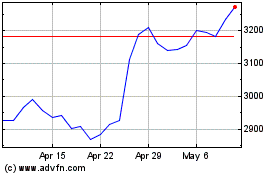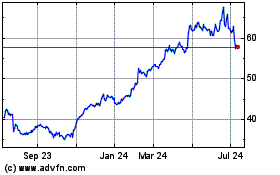By Alexandra Bruell
Advertisers are pressing for unprecedented flexibility to back
out of monthslong spending commitments with TV networks, concerned
that the coronavirus pandemic is sapping the fall schedule of new
programming and threatening the National Football League's
season.
By this time of year, advertisers usually have struck broad
deals governing the TV season that starts each September. This
year, the pandemic scrambled the equation, delaying those deals and
introducing new risks for marketers -- most notably, whether the
content on which they want to advertise will even get aired.
After several college-football conferences decided not to play
in the fall, Chipotle Mexican Grill Inc. shifted some of its ad
spending from college football to NFL games, said Chris Brandt, the
company's chief marketing officer. He now is asking networks for
the ability to back out of those spending commitments if
professional football games get canceled.
"How's the NFL going to work if you're not in a bubble?" Mr.
Brandt said, referring to the National Basketball Association's
effort to keep its players and games confined to the Orlando, Fla.
area. "The number one thing I'm asking for is flexibility."
Advertisers spent close to $5 billion on the NFL last season,
according to ad-tracking firm Kantar. The NFL plans to launch its
season on Sept. 10, and has expressed confidence it will be
completed.
"We really hope the NFL season goes on as currently planned,"
said Rachel Ferdinando, chief marketing officer for PepsiCo Inc.'s
Frito-Lay North America. She said the snack-food maker expects to
spend as much on the NFL as it did in previous years, but is
working with broadcasters to ensure there are contingencies for any
scheduling changes.
Verizon Communications Inc. is asking networks for the ability
to walk back commitments if football games get canceled and to pull
the plug on some ads closer to their air date than in previous
agreements, according to John Nitti, Verizon's chief media officer.
The telecommunications giant is also looking for the flexibility to
move its ad dollars to digital content if the media companies can
show that they would offer the same if not more value, he said.
The NFL's fate is likely to have a major impact on the ad world,
not only because of the partial postponement of college football
but also because little new entertainment programming is being made
due to pandemic-caused production shutdowns.
With production on scripted programs just starting to resume in
dribs and drabs, all the networks are assembling fall schedules
that are a potpourri of unscripted fare, acquisitions from abroad
and shows from either their bench or sister platforms.
ViacomCBS Inc.'s CBS, for example, has said it doesn't expect
any of the new and returning scripted shows it announced in May to
be ready for airing until November at the earliest. Instead, it
will fill the first few months of the fall with episodes of "Star
Trek: Discovery," which traditionally runs on the streaming
platform CBS All Access. The network will also air episodes of the
reboot of "One Day at a Time," a sitcom that initially ran on
Netflix and is now on the ViacomCBS-owned cable channel Pop, as
well as news and reality programming.
"You have a shortage of original content, you have a lot of news
eyeballs that are not easily monetizable and you have two of the
major five conferences in college football being canceled," said
Michael Nathanson, media analyst and founding partner at
MoffettNathanson. "It comes down to the NFL. Can it come back and
for how long?"
Advertisers that pulled out of previous commitments still have
the option to buy time for commercials outside of the broadly
negotiated contracts, but such last-minute ad buys are more
expensive. Many brands are currently choosing to do so, a sign that
some advertisers are spending again, according to both ad buyers
and media executives.
When the pandemic hit earlier this year, the last round of big
TV deals were already in place. Under those deals, marketers
couldn't immediately cancel any spending -- though networks allowed
that to happen in some instances, in a show of good faith. Buyers
typically had the ability to retrieve a portion, around 30%, of
their commitments two to three months before programming was set to
air. That was a provision standard for ad deals.
During this round of ad negotiations, some brands are asking to
be able to withdraw a larger portion -- at least 50% -- of their
commitments much closer to TV air dates, according to ad buyers.
And if the programming doesn't air at all, they often want 100% of
their commitment canceled.
In March, when it was announced that the Tokyo Olympics would be
postponed to 2021, Comcast Corp.'s NBCUniversal asked advertisers
to let it know by July whether they wanted to keep their ad
commitments for the rescheduled event. NBCU also told advertisers
that if they agreed to commit by May, it would guarantee a 4%
increase in views for the same amount of money, according to people
close to the negotiations.
While some ad buyers agreed, others scoffed. The 4% bump was
small given the relatively short time frame to get approval for
such a large media investment during uncertain times, the people
said.
Mike Law, president at Dentsu ad-buying group Amplifi, said
networks went above and beyond to keep advertisers happy, even
though they contractually didn't always have to. "Now, brands are
going to finance and saying, we need approval to make a commitment
into next year. Their finance person is saying, what's the option
to get out?"
TV networks traditionally give advertisers one window every
three months during which they can renege on some of their ad
commitments. This time around, one TV network is giving them two
such windows in the same time frame.
"Some clients were asking for 10 windows," said an executive at
the TV network. "Hey, I get it. We're in uncharted waters here. But
we also have a business to run."
--Joe Flint contributed to this article.
Write to Alexandra Bruell at alexandra.bruell@wsj.com
(END) Dow Jones Newswires
September 02, 2020 14:56 ET (18:56 GMT)
Copyright (c) 2020 Dow Jones & Company, Inc.
Chipotle Mexican Grill (NYSE:CMG)
Historical Stock Chart
From Mar 2024 to Apr 2024

Chipotle Mexican Grill (NYSE:CMG)
Historical Stock Chart
From Apr 2023 to Apr 2024
